Metropolis Blu-ray Movie
HomeMetropolis Blu-ray Movie 
The Complete MetropolisKino Lorber | 1927 | 149 min | Not rated | Nov 23, 2010
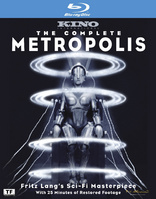
Movie rating
8.5 | / 10 |
Blu-ray rating
| Users | 4.5 | |
| Reviewer | 4.5 | |
| Overall | 4.5 |
Overview
Metropolis (1927)
In a futuristic city sharply divided between the working class and the city planners, the son of the city's mastermind falls in love with a working class prophet who predicts the coming of a savior to mediate their differences.
Starring: Alfred Abel, Gustav Fröhlich, Rudolf Klein-Rogge, Fritz Rasp, Theodor LoosDirector: Fritz Lang
| Foreign | 100% |
| Drama | 98% |
| Sci-Fi | Insignificant |
Specifications
Video
Video codec: MPEG-4 AVC
Video resolution: 1080p
Aspect ratio: 1.33:1
Original aspect ratio: 1.33:1
Audio
Music: DTS-HD Master Audio 5.1 (48kHz, 24-bit)
Music: LPCM 2.0 (48kHz, 24-bit)
Subtitles
Discs
50GB Blu-ray Disc
Single disc (1 BD)
Playback
Region A (C untested)
Review
Rating summary
| Movie | 5.0 | |
| Video | 4.5 | |
| Audio | 4.5 | |
| Extras | 3.0 | |
| Overall | 4.5 |
Metropolis Blu-ray Movie Review
What was lost has now been found.
Reviewed by Casey Broadwater November 12, 2010After Fritz Lang’s Metropolis premiered in Berlin in 1927, the silent science fiction masterpiece was savagely shortened and re-edited for its American release by playwright Channing Pollock, who cut the film from fourteen reels to seven and, in the process, thoroughly obfuscated the original story. Snippets of the excised material surfaced over the decades, and there have been several incomplete restorations—including, most notably, the Giorgio Moroder-speared reissue in 1982, which clarified plot points but also tinted the film and set it to 1970s pop tunes—but Lang’s complete cut was thought to be yet another lost relic of the silent age. That is, until the summer of 2008, when curator Paula Felix-Didier and archivist Fernando Pena found a 16mm safety reduction negative of the uncut Metropolis in the archives of the Museo Del Cine, in Buenos Aires. You might say that this was the film historian equivalent of discovering the Dead Sea Scrolls or the Rosetta Stone. Not only did this print contain almost all of the missing material—minus 8 minutes too damaged to use—but it also served as a narrative blueprint for the multinational restoration team, allowing them to reassemble the entire film to match Lang’s intent. More than 25 minutes of footage has been reintegrated into Metropolis, from single shots to whole sub-plots and action sequences. The result is a film that’s finally as coherent as its images are iconic.
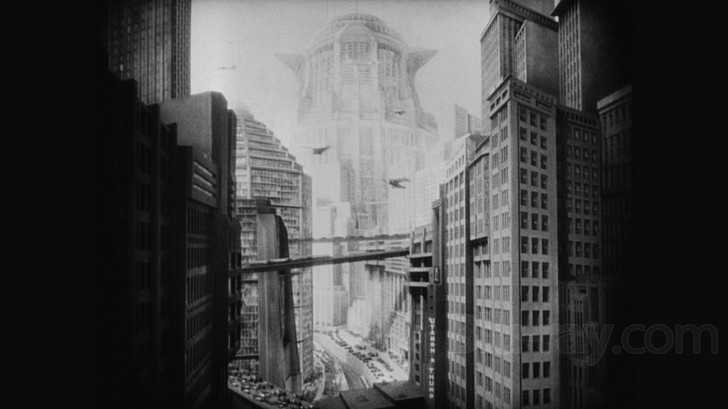
Metropolis
The metropolis of the title is an Art Deco utopia, a skyscraping bourgeoisie dream complete with The Club of Sons, a sporting arena where the elite while away the days with athletic competitions, Yoshiwara, a swanky party palace, and The Eternal Gardens, a kind of artificial biosphere filled with exotic beauties with which to frolic. Ah, the luxuries of leisure! Looming above the angular cityscape is the New Tower of Babel, from which Joh Fredersen (Alfred Abel), the founder and fascist ruler of Metropolis, keeps watch over his creation. Joh has literally built his empire on the backs of the working class, dull-eyed drones who slave away in subterranean factories beneath the city. His son, Freder (Gustav Frölich), becomes obsessed with these have-nots and sneaks into the dystopian underworld, where he witnesses an enormous industrial machine explode, killing a score of workers in the process. Freder is struck by a vision of the machine as Moloch—the Old Testament’s all-devouring god of sacrifice—and, forsaking his wealth, trades places with one of the plebes to experience firsthand how the other half live. The workers are this close to violent revolt, but their anger is temporarily assuaged when Maria (Brigitte Helm), a wide-eyed prophetess, foretells the coming of a “mediator” who will bring peace and balance by bridging the class divide. I wonder who that might be!
“The mediator between Head and Hands must be the Heart,” is the film’s mantra, then, and while this is a too-cozy thesis divided by antithesis equals synthesis statement—a vast oversimplification that offers no real solutions to Europe’s post-war economic imbalances—it does startlingly prefigure, thematically anyway, the ideological crisis that would soon shake the world during WWII. The subterranean proles—the Hands—like the sailors on Eisenstein’s Battleship Potemkin, are primed for a Red revolution. Joh, on the far right end of the spectrum, is the fascist dictator, the Head, the Hitler-esque ruler running the nation-state. Democracy would seem to be the Heart in this analogy, but Metropolis stops well short of showing what “mediating” would actually look like. The closest we get is a begrudging handshake between Joh and Grot (Heinrich George), the foreman of the workers.
Not that it really matters. Lang always expressed dissatisfaction with the film’s rather simplistic philosophical premise—scripted by his then-wife and co-writer Thea von Harbou, who would soon become a staunch Nazi supporter—but the tale he tells within this vaguely Hegelian, class-conflict framework is gripping, especially now that it’s been fully restored. The Thin Man, Joh’s creepy personal spy, is sent on nefarious, never-before-seen errands. There’s more to the love story between Freder and Maria. The escape from the flooded underworld is shown with clearer continuity, and there are new scenes of near-naked excess at Yoshiwara that would’ve been edgy even by pre-Hays Code standards. The most satisfying addition, though, is the fleshed out rivalry between Joh and Rotwang (Rudolph Klein-Rogge), the prototypical mad scientist who creates a female Machine-Man in Maria’s likeness, intending it first as a replacement for the woman Joh stole from him—and who later died giving birth to Freder—and then using the robot in an attempt to “sow discord” and destroy Metropolis. The iconic android, also played by the 17-year-old Brigitte Helm, is a cold, sexpot inversion of Maria’s purity who winks lasciviously, walks with a wanton swagger, and does a burlesque striptease at Yoshiwara that ends in carnage as the patrons are driven into a frenzied orgy of violence.
With its allegorical underpinnings and budget of over 5 million Reichsmarks—making it the most expensive movie of its time—Metropolis can inevitably be compared to Avatar, the latest spectacle-over-story extravaganza, but this undervalues Lang’s film, which is the progenitor of all sci-fi epics that followed it. You can see its influence most clearly in Ridley Scott’s Blade Runner, which borrows the urban architecture of Metropolis and re-fashions the Machine-Man into the concept of “replicants.” Traces of the film’s DNA can be found in Star Wars, Dark City, and The Matrix, and its visual language—electricity and laboratories, technology run rampant— directly inspired the “raygun Gothic” style of 1950s B-movies. And yet Lang doesn’t limit himself to futurism; Metropolis, in the director’s own words, is a “battle between modern science and occultism, the science of the middle ages.” The film is steeped in ominous religious imagery. In a fever dream, Freder is crucified to a clock. The false-Maria rises on the back of the seven-headed Beast from The Revelation of St. John. Pentagrams adorn Rotwang’s workspace and, in a particularly chilling moment, the Seven Sins—personified—come to life, along with Death himself, swinging a scythe directly at the camera. Throughout, Lang employs then-groundbreaking visual effects, using mirrors, miniatures, matting, double exposures and other forms of distinctly filmic, in-camera trickery to bring his nightmare dystopia to life. While his best, most cohesive film was yet to come—1931’s M—Metropolis presents the director as a mad scientist and shaman, a cinematic visionary.
Metropolis Blu-ray Movie, Video Quality 
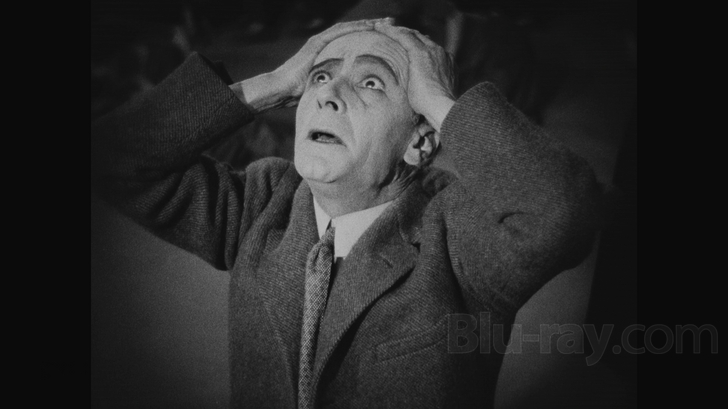
The restoration of Metropolis—a collaborative effort by the Friedrich-Wilhelm-Murnau Foundation, the Deutsche Kinemathek, and the Museo del Cine—has yielded a version of the film that is not only narratively complete, but also visually stunning. KINO's 1080p/AVC-encoded transfer is a beauty to behold. Let's get the obvious out of the way first: the 25-minutes of restored footage, taken from a 16mm reduction dupe of an extremely damaged 35mm print, isn't of the highest fidelity. The image is soft and streaked with vertical scratches, so much so that, at times, it almost looks like the picture is being projected onto a waterfall. (You'll understand when you see it in motion.) This material is windowboxed on three sides to preserve visual, proportional continuity, as the 16mm dupe slightly cropped the original aspect ratio. It's an elegant solution to a tricky problem, and while the switch between sources is jarring at first, you quickly get used to it. The bulk of the film, taken from an original 35mm negative and early prints, looks wonderful. The picture has been given a frame-by-frame clean-up, removing nearly all of the specks and scratches that have eaten away at the nitrate negative in the intervening decades. Just as impressive, there's little evidence of the digital makeover. The image has natural-looking film grain, and there are few compression artifacts or other quirks. Clarity varies, as you might expect, but most of the film is quite sharp, and I found my figurative jaw dropping frequently over the amount of detail that can be seen in Joh's herringbone coat and the plating of the Machine-Man. Black levels are strong as well, and the monochromatic gradation is satisfying, with tight—but never overblown—contrast. Overall, I'm more than pleased. There were moments when I honestly couldn't get over how good the film looks now.
Metropolis Blu-ray Movie, Audio Quality 
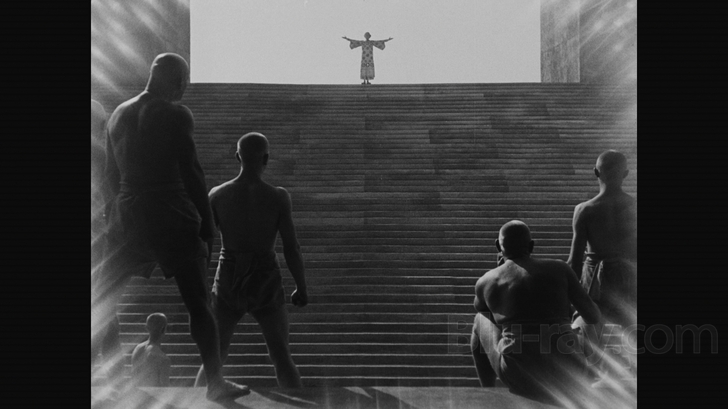
Just as the 16mm dupe provided a blueprint for how to restructure the film, the recent acquisition of the folio of composer Gottfried Huppert's 1927 score gave the restoration team numerous clues about the pacing of the film and the timing of the editing. This orchestral score—a bombastic affair that borrows from Wagner and Strauss—has been newly recorded and presented here in two formats: a DTS-HD Master Audio 5.1 surround track, and a LPCM 2.0 stereo fold-down. Both options sound rich and dynamically full. I have no complaints whatsoever—this is the original score, reproduced wonderfully—but some folks might understandably be miffed that KINO hasn't also included the fan-favorite score by The Alloy Orchestra. No subtitle options are offered—or required—as the original German intertitles have been replaced with all-new English ones. Purists may growl, but the restoration team at least used a classy, period-accurate font.
Metropolis Blu-ray Movie, Special Features and Extras 
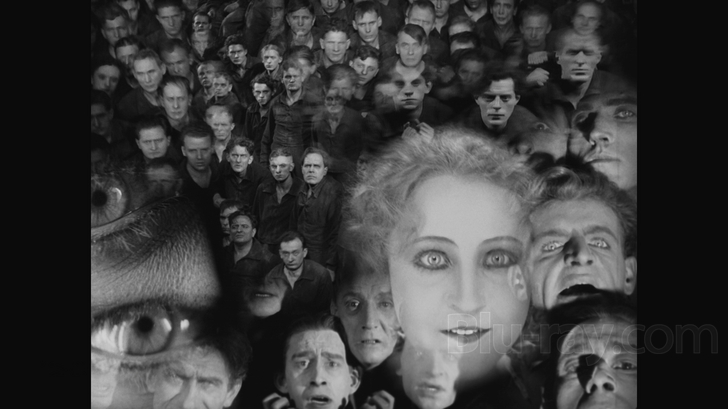
For such a monumental release, KINO's selection of supplements is rather slim, but thankfully, the material that is presented here is excellent. The bulk of the experience is Voyage to Metropolis (1080p, 54:42), a documentary by Artem Demenok that explores the making of the film, its deconstruction at the hands of Channing Pollock, and its eventual restoration. Along with expert info from a cavalcade of film historians, the doc also features vintage interviews with Fritz Lang and loads of stills and pre-production artwork. A must-watch! Also included is an interview with Paula Felix- Didier (1080p, 9:31), the curator who discovered the lost footage, and a promotional trailer (1080p, 2:01) for the 2010 re-release of the film.
Metropolis Blu-ray Movie, Overall Score and Recommendation 
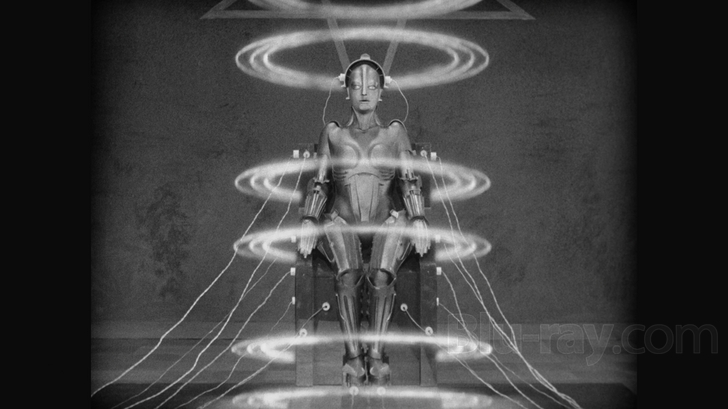
It's hard to overstate the influence of Metropolis, not only on sci-fi films and cinema in general, but also on architecture, urban planning, and industrial design. Visually, the film has always been a masterpiece, even if—in its truncated form—it never made much narrative sense. Well, finally, thanks to the fortuitous discovery of 25-minutes of missing footage and the efforts of the restoration team, it does make sense, and the additions confirm and redouble the film's standing as one of the greatest science fiction films of all time. That Metropolis—an 83-year-old film—is so stunning on Blu-ray is just visual icing on the comprehensive cake. For cineastes, sci-fi fans, and silent film collectors, this is a must-see, must-own release. Highly recommended!
Similar titles
Similar titles you might also like

Four Around the Woman
1921

Vivre sa vie
Vivre sa vie: Film en douze tableaux / My Life to Live
1962

The Seventh Seal
Det sjunde inseglet
1957

Wrong Move
Falsche Bewegung
1975

The Conformist
Il Conformista | 4K Restoration
1970

La Dolce Vita
1960

The Forgiveness of Blood
2011

Ali: Fear Eats the Soul
Angst essen Seele auf
1974

Sunrise
Sunrise: A Song of Two Humans
1927

La Notte
1961

Woman in the Moon
Frau im Mond
1929

Stray Dogs
郊游 / Jiao you
2013

The Holy Mountain
Der heilige Berg
1926

Saraband
2003

Dr. Mabuse: The Gambler
Dr. Mabuse, der Spieler - Ein Bild der Zeit
1922

Barbara
2012

A Married Woman
Une femme mariée: Suite de fragments d'un film tourné en 1964
1964

Red Desert
Il deserto rosso
1964

Hard to Be a God
Трудно быть Богом
2013

The Diving Bell and the Butterfly
Le scaphandre et le papillon
2007